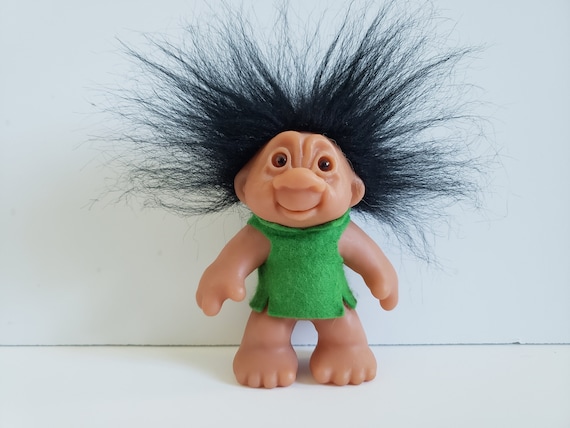Terror of the Autons
"I am usually referred to as The Master!"
"Oh? Is that so?"
"Universally!"
In this serial, a mysterious figure named the Master, a Time Lord, arrives and begins to work with the Nestine Consciousness to invade the Earth. The Doctor is warned by the Time Lords of this, as the Doctor is aware of the Master's infamy. The Master's plan involves taking over a plastics factory to create special new forms of Autons for the Nestine to control and kills anyone who gets in his way. This includes controlling the mind of the Doctor's newest assistant Jo Grant. The Doctor continues to investigate, dodging several nasty traps set by the Master. Around this time, the Doctor also manages to swipe a dematerializer from the Master's TARDIS, hoping it will work with his. The Master's trail of death eventually leads the Doctor to discovering that his plot involves plastic daffodils. It turns out the daffodils are designed to shoot a plastic film in the face that kills people via suffocation. The Master decides to kill the Doctor in person but when Jo lets slip that UNIT is about to destroy the Auton invasion force, he takes the Doctor hostage. Eventually, the Doctor escapes and a fight breaks out between an Auton army and UNIT. During this time the Master uses a satellite dish to summon the Nestine but the Doctor convinces him the Nestine will not differentiate between the Master and all the human targets. The Master helps the Doctor but then escapes, with the Doctor excited about their next conflict.
This is an odd one. Objectively there is a lot to pick at in terms of story construction. There are few stories in this world that are completely airtight. That's fine. The trick is to weave an illusion over the audience so the flow of the story makes it so they don't notice. Terror of the Autons is NOT airtight. It's not incompetent in it's mistakes and they aren't big obvious things but they aren't deeply subtle either. And this in no way ruins the story, which is really fun. Granted, I feel like characters forget to do obvious things. Why did the Doctor leave Jo with a troll doll he KNOW is capable of murder and not lock it up? Why do we need to reiterate so many times "Nestine can control plastic" and then UNIT keeps forgetting (I know they are there to be less competant in the Doctor and do violence the story needs but it feels like they are babies if they need to be reminded so often)? Is the Doctor just so cavalier about a challenge that he's not terribly interested in the body count?
That last one is interesting to me. I actually could see a Doctor who is having fun in spite of his values. But I feel last season established Pertwee as not having a lot of patience for killing. OK, yes, he's willing to work with UNIT after they did a genocide of an ancient race but it feels like Pertwee's Doctor is a little different here. And part of that is the tone is different. Despite his bon mots, the last season was surprisingly sober at times, even with rubber headed lizard men bobbing their heads to the goofiest music imaginable. This, however, despite the body count, is pure Saturday morning stuff. The Master is a Moriarty figure but he's also straight up comic book villain with ridiculous number of plans and traps and methods for killing. There's also a bit of disjointedness between him killing a lot of people and the actual invasion (was the murder just killing time to do the big satellite thing?)
Again, there's so much to pick apart but... I'm having a blast. So much interesting stuff was happening from scene to scene, which is something a lot of even the better Doctor stories of the early era struggle with. The Master is a lot like the Joker, though not at first. He starts out being all business and he doesn't even seem to be terribly interested with his ridiculous chair based murder. But he tells us many times he's having a lot of fun with this one because of the Doctor and the Doctor happily admits it's a reciprocated feeling in the end. Which I like for a relationship but weird because as malleable as the Doctor is as a character and as much as many incarnations enjoy problem solving, he rarely seems to want to entertain murderers. I like the relationship but I also think it kind of doesn't make a lot of sense. It's more interesting in the new Who run where he is really upset that he's doing such evil plans but he can't "hate" him like he does the Daleks because there's a kindred spirit in him both being the last of their race and also having values that run counter to the time lords.
Obviously I'm getting ahead of myself, though. So let's look back. Episode two is the first episode I ever saw. Based on my memory, I was probably in preschool or kindergarten but it scared the shit out of me. The killer chair, the troll doll. It looks ridiculous now but kids don't have an irony filter. To me, it was weird, disturbing imagery. I watched it with my dad. I think I probably came down stairs not being able to sleep or something. It's interesting because my dad is a big sci-fi fan who got me into Star Wars yet as I know him when I grew older, he much preferred either hard sci-fi or at least ones that were less adventure based. Not usually into the usually Wars/Trek/DW stuff, at least later in life. But this meant a lot to me and as a kid it was a "scary show", But it also lived in my head and I was excited to watch it when it was airing on YTV (Canada's version of Nickelodeon). It started being in the afternoon but when it started airing only late at night... well, in grade five I started waking up at three AM and watching it. I even learned to set my VCR for it. So this episode was a big deal to me.
And it's still a good one. I think it establishes the tone for the season will be a bit more fun. Perhaps at a cost; last season was a little darker and more sober but I think it was largely decent. I like the comic book madness here but like losing the historicals, it feels like a bit of a loss. I am aware (assuming I'm not incorrect") that this is the Master season and every episode is the Master collaborating with a new invading force. The Master is interesting because he is Moriarty but I think every invasion ends with him going "uh-oh, got betrayed again" which makes him seem... kinda dumb. So by the end of the episode, he's also Team Rocket. He's the evil Doctor, which is an obvious decision and has already been done (re: The Monk, who I really do think needed a return episode as more a Harry Mudd figure) but it works because of how rarely the Doctor faces someone like himself. He fights fascistic invaders and tyrants, as well as delusional humans but rarely someone who is a clever agent of chaos who toys with systems. I think that's why his opening sternness threw me off but why it also works; both he and the Doctor are constantly short of patience with the humans they are working with and would just be happier if everyone just did things their way.
Oh, jeez, I almost forgot. Jo Grant is in this. Whew, I feel like she got the short end of the stick in a very different way than Liz. Liz is competent but mostly gets stuck relaying info to other characters. Jo is more in the classic companion mold (relatively young, trying to help) for better or worse but I feel like she might be getting the least respect from any other companion so far. Everyone flat out tells her to stay home and most of the time she gets involved she makes things worse. I guess she... stole a ring from the Master or something? In all honesty, I completely missed whatever the Doctor was thanking her for while he did a morse code message with the brake lights (seriously, this is pure Batman nonsense). Hopefully she might grow beyond a damsel but this era somehow seems worse for it's female characters.
Best cliffhanger: Though the resolution is rather dull (the Doctor calls for help, someone helps him), the killer telephone wire is pure Master; needlessly elaborate but also silly. Yet as effective is "come in with a gun and murder him" would have been, it's really all about saying "LOOK AT WHAT I CAN DO!"
Next time:





